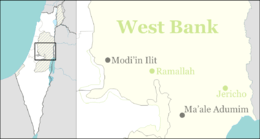Kokhav HaShahar
| Kokhav HaShahar כּוֹכַב הַשַּׁחַר | |
|---|---|
|
| |
 Kokhav HaShahar | |
| Coordinates: 31°57′36.00″N 35°20′52.80″E / 31.9600000°N 35.3480000°ECoordinates: 31°57′36.00″N 35°20′52.80″E / 31.9600000°N 35.3480000°E | |
| District | Judea and Samaria Area |
| Council | Mateh Binyamin |
| Region | West Bank |
| Affiliation | Amana |
| Founded | 1979 |
| Population (2017)[1] | 2,053 |
| Name meaning | Morning Star |
Kokhav HaShahar (Hebrew: כּוֹכַב הַשַּׁחַר, also spelt Kochav Shachar and Kochav HaShachar, trans. Morning Star) is an Israeli settlement organized as a community settlement in the Binyamin region of northern West Bank. Located on a mountain ridge overlooking the Jordan Valley, and accessible via the Allon Road, it falls under the municipal jurisdiction of Mateh Binyamin Regional Council. In 2017, it had a population of 2,053.
The international community considers Israeli settlements in the West Bank illegal under international law, but the Israeli government disputes this.[2]
History
Kokhav HaShahar was founded by nine young couples in 1979 on the site of an Israel Defense Forces outpost
According to ARIJ, Israel confiscated land from two Palestinian villages in order to construct Kokhav HaShahar:
- 1,264 dunam of land were taken from Deir Jarir,[3]
- 433 dunam of land were taken from Kafr Malik.[4]
Near Kokhav HaShahar is a site of one of many quarries operated by Israeli companies in the West Bank. Yesh Din legal counsel Michael Sfard said that "according to international law, so long as the West Bank is not annexed to Israel, it is forbidden for Israel to exploit the natural resources there for non-security related purposes." Sfard also stated that 74% of the gravel mined from these quarries is used for construction inside Israel, and that that means the existence of the quarries violates international law.[5][6][7]
Maoz Esther, north of Kokhav HaShahar and east of Ramallah, was an outpost established in 2005 by Kokhav HaShahar residents in memory of Ester Galia of Kokhav HaShahar who was murdered at Rimonim junction. The Israel Police destroyed the settlement's seven huts in May 2009.[8] After settlers attempted to rebuild the outpost, it was demolished again on 13 October 2010.[9]
References
- ↑ "List of localities, in Alphabetical order" (PDF). Israel Central Bureau of Statistics. Retrieved August 26, 2018.
- ↑ "The Geneva Convention". BBC News. 10 December 2009. Retrieved 27 November 2010.
- ↑ Deir Jarir Village Profile, ARIJ, p. 19
- ↑ Kafr Malik Village Profile, ARIJ, p. 19
- ↑ Yaakov Lappin (May 21, 2009). "Israel freezes expansion of West Bank quarries following High Court petition". Jerusalem Post. Retrieved August 22, 2012.
- ↑ The Guardian: Israeli companies can profit from West Bank resources, court rules
- ↑ Israeli companies can profit from West Bank resources, court rules Harriet Sherman, January 4, 2012, The Guardian
- ↑ Israeli police remove settlement outpost BBC News, 21 May 2009
- ↑ Israel Police Demolish Maoz Esther--Again Chana Ya'ar, Arutz Sheva, 13 October 2010.